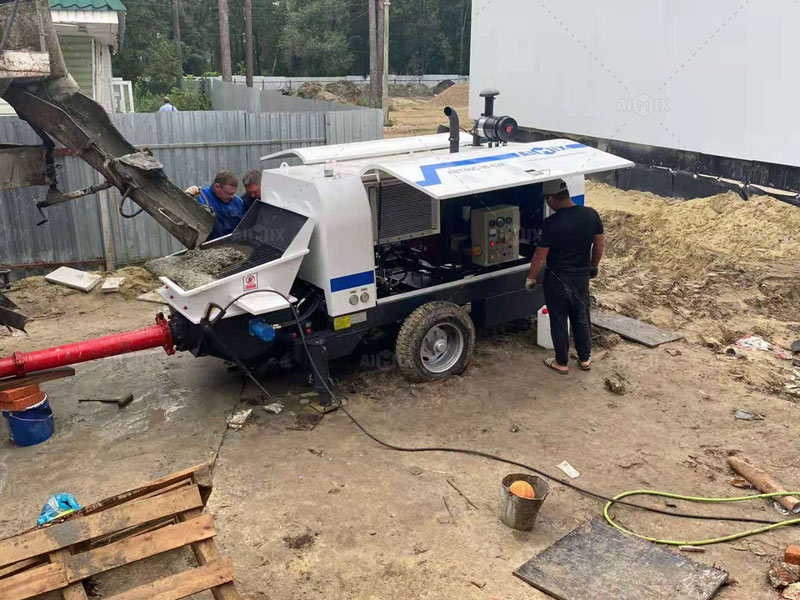Concrete pumps are essential equipment in construction projects, facilitating efficient and continuous concrete delivery. One of the most critical factors influencing the performance, durability, and price of concrete pumps is the type of power unit they use. Different power units bring distinct advantages and challenges, affecting the overall concrete pump price. This article analyzes how various power units impact concrete pump costs, focusing on popular options like concrete pump trucks and trailer concrete pumps.
The Role of Power Units in Concrete Pumps
The power unit is the core component that drives the hydraulic system of a concrete pump, providing the necessary energy for pumping operations. Its quality, efficiency, and technology level directly influence the performance, maintenance requirements, and price of concrete pump(bomba de hormigón precio). Understanding these differences is crucial for buyers seeking to optimize their investment in concrete pumping equipment.
Common Types of Power Units
- Diesel Engine Power Units: Widely used in concrete pump trucks and trailer concrete pumps, diesel engines offer strong power output and excellent mobility without relying on external power sources.
- Electric Motor Power Units: Typically found in stationary concrete pumps or plants, electric motors provide stable power with lower noise and emissions but require a reliable power supply.
- Hybrid Power Units: Combining diesel and electric power, hybrid units aim to balance efficiency, environmental impact, and operational flexibility.

Impact of Power Unit Type on Concrete Pump Price
The choice of power unit significantly influences the concrete pump price due to differences in manufacturing complexity, component costs, and operational characteristics.
Diesel Engine Concrete Pumps
Diesel engines are favored for their high power density and portability, especially in mobile concrete pump trucks and trailer concrete pumps. Their widespread availability and mature technology contribute to a relatively moderate concrete pump price.
However, diesel-powered pumps often incur higher fuel and maintenance costs over time. Buyers should consider not only the initial concrete pump price but also long-term operational expenses.
Electric Motor Concrete Pumps
Electric motor-powered concrete pumps(bombeadora de concreto) generally have a lower purchase price compared to diesel counterparts, partly due to fewer mechanical components. Additionally, electric pumps benefit from lower energy costs and reduced maintenance, which can be attractive for stationary applications.
Nevertheless, their dependence on a stable power supply limits mobility, making them less suitable for remote or frequent job site changes.
Hybrid Concrete Pumps
Hybrid power units combine diesel and electric systems to provide flexibility and improved fuel efficiency. Although hybrid concrete pumps tend to have a higher upfront concrete pump price, they offer significant savings on fuel consumption and emissions, aligning with growing environmental regulations.
For contractors with mixed usage patterns or those prioritizing sustainability, hybrid units can present a balanced investment despite the higher initial cost.

Influence of Power Units on Different Concrete Pump Types
Concrete Pump Trucks
Concrete pump trucks(Autobombas de hormigon) primarily use diesel engine power units due to their need for mobility and high power output. The diesel engine’s robustness allows these trucks to operate efficiently in diverse job site conditions.
The diesel engine choice often results in a higher concrete pump price compared to trailer concrete pumps, but the added mobility and performance justify the cost for many contractors.
Trailer Concrete Pumps
Trailer concrete pumps offer flexibility and affordability, with options for both diesel and electric power units. Diesel-powered trailer pumps are popular for construction sites lacking stable electricity, whereas electric-powered units suit fixed or urban projects with reliable power access.
The power unit selected for trailer concrete pumps greatly affects the price. Diesel variants generally cost more upfront but provide greater autonomy, while electric models have lower concrete pump prices but higher dependency on site infrastructure.
Additional Factors Linking Power Units to Concrete Pump Prices
Maintenance and Operational Costs
Power units with advanced technology and better fuel efficiency often reduce operational costs, offsetting higher initial concrete pump prices. Conversely, simpler power units may cost less upfront but lead to increased maintenance and fuel expenses.
Environmental Regulations
Stricter emission standards in many regions push manufacturers to adopt cleaner power units like hybrid or electric systems. Compliance with these regulations can increase concrete pump prices but also offer tax incentives or operational benefits.
Technological Integration
Power units integrated with intelligent control systems and diagnostics enhance performance and reduce downtime, adding value to the concrete pump but potentially increasing the price.
Conclusion
The power unit is a decisive factor influencing concrete pump price and performance. Diesel engines dominate mobile concrete pump trucks and many trailer concrete pumps(bomba estatica hormigon) due to their power and flexibility, though they come with higher fuel and maintenance costs. Electric power units offer lower purchase prices and operating costs but are limited by power supply constraints. Hybrid systems provide an eco-friendly alternative with higher initial investment but potential savings over time.
When choosing between concrete pump trucks and trailer concrete pumps, buyers should carefully evaluate power unit types alongside project needs, budget, and operational environment to select the best equipment that balances price and performance.